Do Poodles Have Sensitive Stomachs?
Poodles are famous dogs for their active and proud nature, as well as their high intelligence. However, many dog owners ask, “Do Poodles have sensitive stomachs?”
They do, and certain symptoms in your Poodle can cause alarm and may have you running to your veterinarian for answers. Thankfully, there are some easy ways to tell if your Poodle has stomach sensitivity to something typical for them. Poodles can develop stomach sensitivity when they’ve eaten something unhealthy, had a quick diet transition, or have allergies.
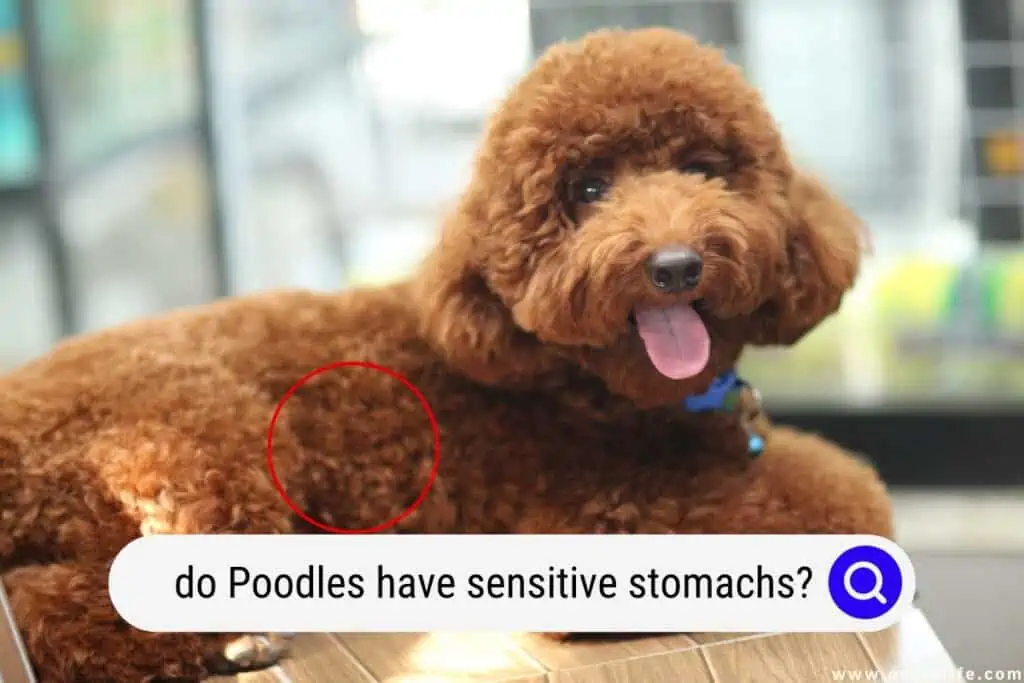
There are many ways you can help your Poodle when their stomach sensitivity flares up and prevent future incidents of stomach sensitivity. Take note of any symptoms your Poodle is having, and always call your veterinarian if you have concerns about your Poodle’s health.
Signs of Stomach Sensitivity in Poodles
Now that you know the answer to “Do Poodles have sensitive stomachs?” you can watch out for several signs. Some symptoms are easy to spot, especially for those who walk and maintain their Poodle daily. Other symptoms may be difficult to notice if you are busy during the day and don’t have much time to spend with your dog.
Consider writing down the signs you notice in your Poodle and log their behavior when you start to see something wrong.
Diarrhea
Diarrhea is a common symptom of stomach sensitivity and may happen at inopportune times. Be patient with your Poodle if they have an accident in the house. They may have little or no control over their bowel movements if their stomach is having a sensitivity issue.
Take careful note of how often your Poodle has diarrhea and compare that with any recent changes you’ve made in the home.

Appetite Loss
Your Poodle may experience appetite loss when they have stomach sensitivity. This appetite loss may mean that you have trouble getting them to eat. A Poodle with stomach sensitivity may leave food untouched for a day or two.
Sometimes, dogs may not eat if they don’t feel like it. However, if appetite loss is a chronic issue, they may need more investigation into potential stomach problems.

Vomiting
Your Poodle may vomit if they are feeling a sensitive stomach. Vomiting may be frequent over the first few days that they feel sick. Consider bringing them to an emergency veterinarian if they vomit more than three times within 12 hours.

Fatigue
Your Poodle may be excessively tired when they have stomach sensitivity. Take careful note of your Poodle’s sleeping patterns to see if they sleep more than usual. Stomach sensitivity can be assuaged with naps, but if they are spending all of their time sleeping, they may need a trip to an emergency veterinarian.

Excess Gas
If your Poodle releases excessive gas during the day, it may have an upset stomach or some sensitivity. Excess gas can come with gurgling noises from their stomach or vomiting.
Gently lay your head on your Poodle’s stomach and listen for any gurgling noises or suspicious sounds they are making.
Causes of Stomach Sensitivity
Stomach sensitivity has many causes, but some may need the help of a professional. Parasites, bacteria, and worms can make your Poodle’s stomach upset, and these causes will need attention from your veterinarian to prescribe medication and treatment.
However, there are other causes for stomach sensitivity, like anxiety, allergies, and diet changes. When your dog feels anxious or stressed, their stomach may start acting up. Diet changes can change the composition of your Poodle’s gut biome and wreak havoc on their stomach.
Bacteria or Parasites
Bacteria, parasites, or worms will need the aid of your local veterinarian to solve. Your veterinarian may prescribe dewormers or antibiotics to help your dog feel happy and healthy again.
Bacteria, parasites, or worms can trigger a host of stomach problems, including whimpering, crying, and overall pain in your Poodle. There are five kinds of worms that can plague your dog:
- Heartworms
- Whipworms
- Roundworms
- Tapeworms
- Hookworms

Diet Changes
Changing your Poodle’s diet can cause many stomach problems, especially if they’ve had the same diet for a long time. Some dog breeds are more susceptible to changes in their diet than others. Poodles are quite picky and aren’t interested in treats or meal time as much as other dog breeds.
This disinterest in meal time can prove challenging during training, but it can be a strong indicator that a change in food is the cause of a sensitive stomach.
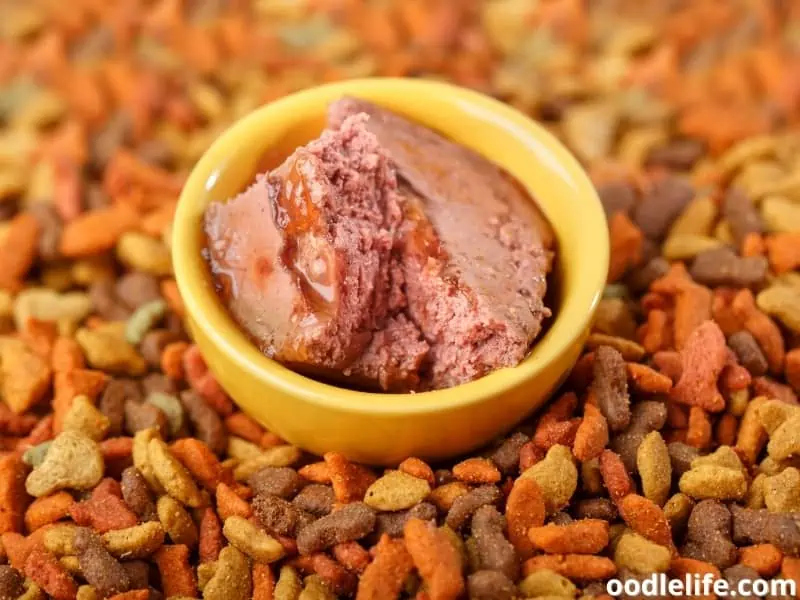
Allergies
Dogs can get allergies just like humans can. Allergies in dogs can present with itchiness, rashes, diarrhea, vomiting, and chronic licking. Dogs with food allergies may avoid new food altogether to avoid a flare-up of symptoms.
Dogs who are allergic to external factors may not have an appetite while they recover from exposure. Consider taking your dog to your veterinarian to test for food and environmental allergies.
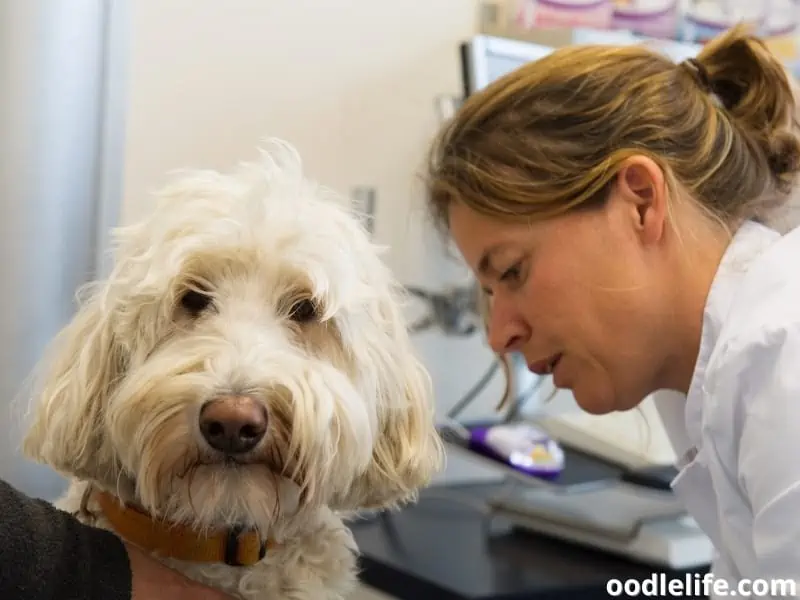
Separation Anxiety or Stress
Dogs can get separation anxiety and feel stress much in the same way that babies and children do. If your dog is experiencing stomach distress while also pacing the floors, barking a lot, and being destructive, they may be experiencing stress or separation anxiety.
Your dog may also try to grab your attention by having potty accidents in the house, drooling a lot, or following you around the house. Dogs who are given a special place to be in the home might try desperately to escape and be with you if they feel stressed or anxious.

Treating Stomach Sensitivity
Thankfully, treating stomach sensitivity can be done in the home for minor issues. Although it may still be nerve-wracking, you can help your Poodle enjoy a calm and relaxed stomach after some time.
Some solutions include monitoring feeding more closely, making sure they drink plenty of water, and giving them the attention they require to feel secure and safe.
Pause Feeding Schedules
Temporarily stop feeding your dog when you notice they are experiencing a sensitive stomach. Although they may be hungry, pausing their food intake can help them feel better and won’t overwhelm their already sensitive stomach.
If your dog’s stomach sensitivity is happening due to a diet change, feeding them may only make the stomach problems worse.
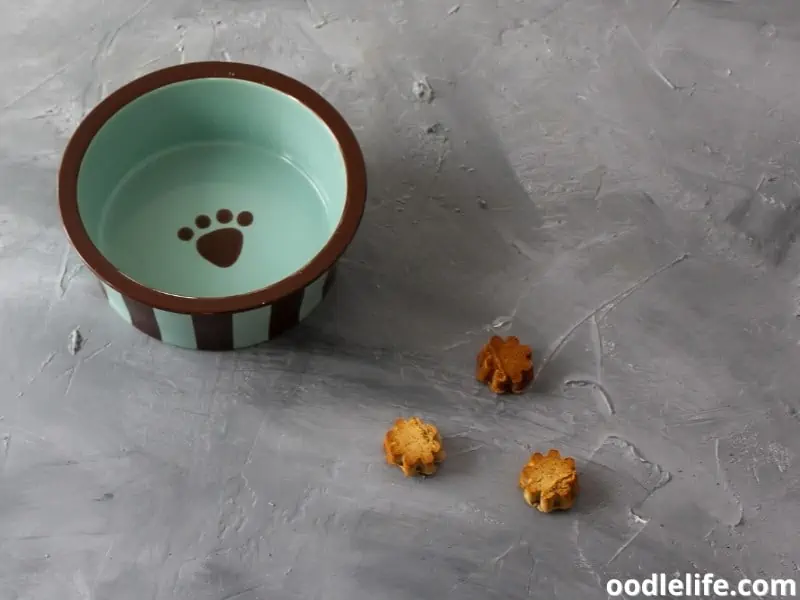
Give Them Pumpkin
Pumpkin is an ideal treat for dogs no matter how they feel. However, when your dog is sick, canned pumpkins can help give them a boost of vital nutrients and minerals. Pumpkin can help your dog recover from diarrhea and help give them more fiber.
Canned pumpkin is also rife with prebiotics that can help strengthen good bacteria in your dog’s microbiome.

Make Sure They Hydrate
Ensure that your Poodle is constantly hydrated. If your Poodle has a sensitive stomach, more water can help flush out nasty bacteria and help them achieve good health again. This may require frequent potty breaks or include accidents in the house, but have patience with your Poodle.
Offering water can help them recover much faster than if they had no access to water.
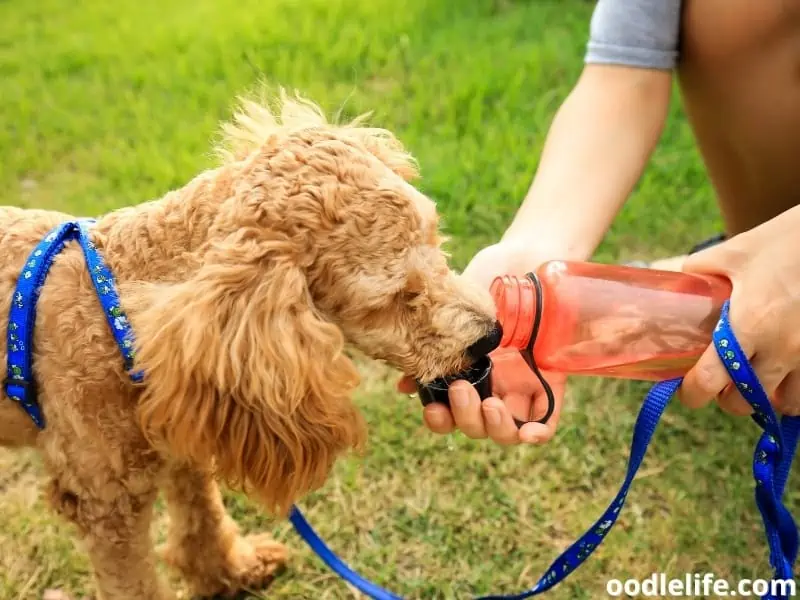
Give Them Plenty of Attention
Poodles can have severe separation anxiety and stress, but offering them plenty of attention and affection can help them become more secure in your absence. Training them to be more secure without you will take time and plenty of patience, but it will help them feel more comfortable during long stretches of alone time.
Use training treats and commands while leaving the room for several minutes to get them acclimated to your absence and show them you’ll always come back for them.

Final Thoughts
So, do Poodles have sensitive stomachs? Poodles are active and highly intelligent dogs, but sometimes they can feel under the weather. When your Poodle has a sensitive stomach, many of the symptoms may just indicate they need plenty of rest and water.
Although alarming for many Poodle owners, an upset stomach will subside and can be helped with some key steps.
Always have canned pumpkins in the pantry to help when your dog has an upset stomach. Canned pumpkin can help your dogs get any bad bacteria out of their stomach and make them feel better faster. Also, feel free to call your veterinarian with any concerns or qualms you may have regarding your Poodle’s food or symptoms.
Take careful note of how your dog is feeling and the way they are behaving. Fatigue, vomiting, and excess gas are only some signs of stomach sensitivity in Poodles. Be mindful of any diet changes you have made to help your Poodle be comfortable and healthy.
